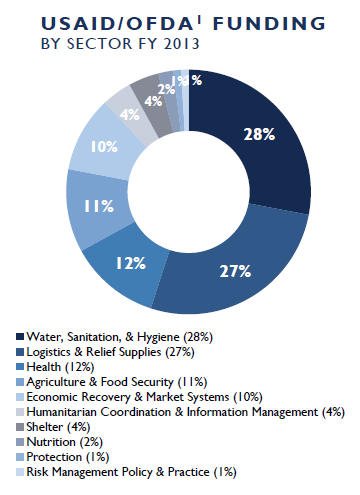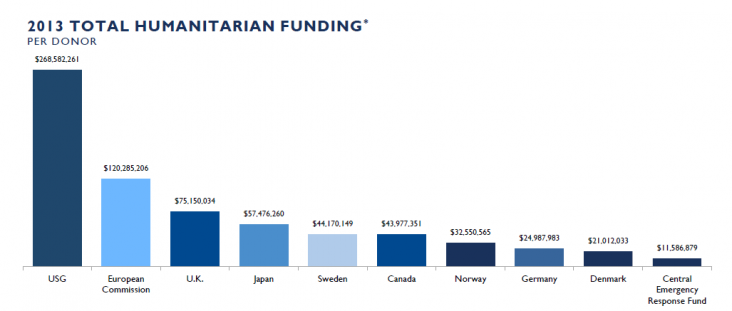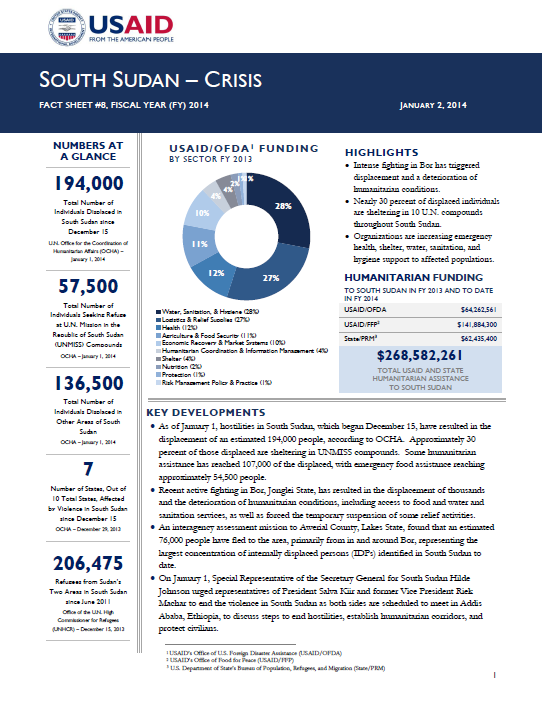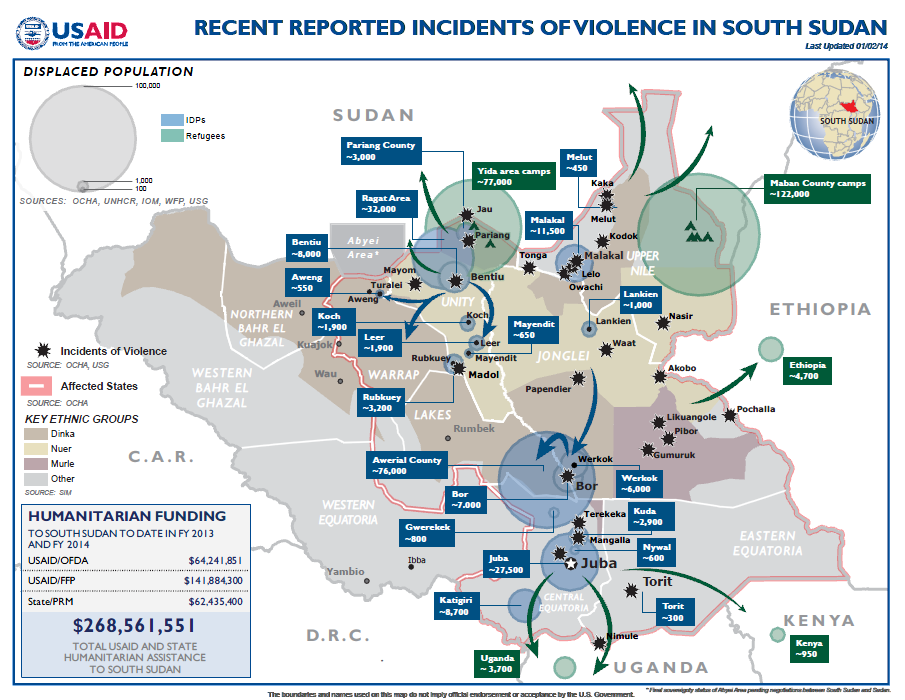- What We Do
- Agriculture and Food Security
- Democracy, Human Rights and Governance
- Economic Growth and Trade
- Education
- Environment and Global Climate Change
- Gender Equality and Women's Empowerment
- Global Health
- Humanitarian Assistance
- Transformation at USAID
- Water and Sanitation
- Working in Crises and Conflict
- U.S. Global Development Lab
Speeches Shim
January 2, 2013
Numbers At A Glance
194,000
57,500
136,500
7
206,475
Humanitarian Funding:
To South Sudan To Date In FY2013 and FY2014:

| USAID/OFDA | $64,262,561 |
| USAID/FFP | $141,884,300 |
| State/PRMDoD | $62,435,400 |
| TOTAL | $268,582,261 |
Highlights
Intense fighting in Bor has triggered displacement and a deterioration of humanitarian conditions.
Nearly 30 percent of displaced individuals are sheltering in 10 U.N. compounds throughout South Sudan.
Organizations are increasing emergency health, shelter, water, sanitation, and hygiene support to affected populations.
KEY DEVELOPMENTS
As of January 1, hostilities in South Sudan, which began December 15, have resulted in the displacement of an estimated 194,000 people, according to OCHA. Approximately 30 percent of those displaced are sheltering in UNMISS compounds. Some humanitarian assistance has reached 107,000 of the displaced, with emergency food assistance reaching approximately 54,500 people.
Recent active fighting in Bor, Jonglei State, has resulted in the displacement of thousands and the deterioration of humanitarian conditions, including access to food and water and sanitation services, as well as forced the temporary suspension of some relief activities.
An interagency assessment mission to Awerial County, Lakes State, found that an estimated 76,000 people have fled to the area, primarily from in and around Bor, representing the largest concentration of internally displaced persons (IDPs) identified in South Sudan to date.
On January 1, Special Representative of the Secretary General for South Sudan Hilde Johnson urged representatives of President Salva Kiir and former Vice President Riek Machar to end the violence in South Sudan as both sides are scheduled to meet in Addis Ababa, Ethiopia, to discuss steps to end hostilities, establish humanitarian corridors, and protect civilians.
SITUATION AND DISPLACEMENT UPDATE
Between December 30 and January 1, violence continued in Jonglei, Unity, and Upper Nile States. In Bor, Jonglei State, ongoing clashes—compounded by aerial bombing and shelling—forced many to flee their homes, with some seeking shelter at the Bor UNMISS base and others fleeing to Awerial. Insecurity has constrained humanitarian access to respond to emergency needs among those displaced in Bor, with the U.N. reporting limited food supplies and poor water and sanitation conditions. The majority of supply warehouses in the area are inaccessible or have been looted.
An interagency assessment mission to Awerial County reported that the majority of the estimated 76,000 IDPs who have fled to the area originated from Jonglei State. In addition, approximately 8,000 are residing at the UNMISS base in Bentiu and 2,500 at the compound in Pariang, Unity State.
Since fighting began in mid-December, nearly 900 people have received medical treatment at UNMISS clinics in Bor; Malakal, Upper Nile State; and Unity, as well as other referring medical facilities, according to the U.N. World Health Organization (WHO).
Heavy fighting continues to limit humanitarian organizations from conducting assessments and providing assistance in many areas. The U.N. notes that protection remains a priority concern due to civilian casualties in areas of active hostilities, as well as reports of physical abuse and the targeting of civilians based on ethnicity and political affiliation.
With approximately 57,500 people residing in 10 UNMISS bases throughout the country, concentrated living quarters with limited water, sanitation, and hygiene (WASH) infrastructure increase the risk of spreading diseases, particularly waterborne illnesses. WHO is working with health-focused organizations to support health education and identify health personnel within the displacement camps who are able to provide primary health care services. Through the USAID Office of U.S. Foreign Disaster Assistance (USAID/OFDA)-funded Rapid Response Fund (RRF)—an International Organization for Migration (IOM)-managed fund that enables quick and agile responses to incipient disasters— one national non-governmental organization (NGO) is providing emergency health services to IDPs in the Juba U.N. House 3 UNMISS compound, as well as supporting improved sanitation and hygiene promotion.
South Sudan Crisis Fact Sheet #8 January 2, 2014 ![]() (pdf - 356k)
(pdf - 356k)
HUMANITARIAN RESPONSE IN JUBA, CENTRAL EQUATORIA STATE
As of January 1, the U.N. World Food Program (WFP) had distributed one-week food rations to approximately 29,900 people sheltering in the two UNMISS bases—Tong Ping and U.N. House 3—in Juba. Humanitarian actors have also established screening centers at the two Juba UNMISS bases for children suffering from acute malnutrition.
IOM had registered 15,500 IDPs in the UNMISS Tong Ping compound as of December 30. Relief agencies are distributing emergency relief supplies, including plastic sheeting, water containers, and mosquito nets, reaching approximately 15,500 people at Tong Ping. Distributions for 12,000 IDPs at U.N. House 3 compound began on January 1.
To improve sanitation conditions for displaced populations, humanitarian actors have constructed approximately 260 latrines at U.N. House 3 and 220 at Tong Ping. Through the USAID/OFDA-funded RRF, two national NGOs are providing water, sanitation, and hygiene support—including emergency latrine construction and water trucking—at U.N. House 3.
Given the crowded conditions in the Juba UNMISS bases, the U.N. has identified an alternative site near U.N. House 3 to host displaced families. UNMISS is discussing the space with RSS officials while organizations have begun planning infrastructure and services for the site to allow individuals to relocate within the next three months.
Relief organizations have completed an emergency measles and polio vaccination campaign in Tong Ping compound, reaching approximately 4,500 children by December 31. A vaccination campaign has begun in the U.N. House 3 base and organizations are planning similar campaigns in Awerial, Bentiu, and Malakal.
OCHA reports that relief organizations have constructed 23 tents with the capacity to shelter more than 1,000 people in the UNMISS Tong Ping base.
To enhance reproductive health services and support survivors of gender-based violence, the U.N. Population Fund (UNFPA) and other relief agencies are providing emergency health and reproductive kits, including medication and rape treatment kits, to health-focused partners. UNFPA also plans to conduct rapid assessments in affected areas to determine the sexual and reproductive health needs of women and children.
South Sudan Crisis Map #8 January 2, 2014 ![]() (pdf - 402k)
(pdf - 402k)
HUMANITARIAN NEEDS AND RESPONSE IN OTHER AREAS OF SOUTH SUDAN
Hostilities in Bor have triggered the suspension of primary and trauma health care services as many health workers have fled, leaving facilities such as Bor State Hospital closed due to security concerns and insufficient staffing, according to WHO. Active fighting also prevented a WASH team from completing the construction of latrines for IDP populations.
To respond to increased conflict-related medical needs, the U.N. notes that surgical support is needed in Bor, Bentiu, Juba, and Malakal. Health-focused NGOs are establishing mobile health clinics to provide primary care for IDPs in and around the UNMISS compounds in Malakal and Bentiu, as well as populations in Awerial County.
Of the organizations providing medical support, the International Committee of the Red Cross (ICRC) has deployed surgical teams and medical supplies to support emergency services at hospitals in Bentiu, Juba, and Malakal. WHO has also provided trauma and emergency health kits to UNMISS clinics and health NGOs offering medical services in Central Equatoria, Jonglei, Unity, and Upper Nile states.
ICRC, in cooperation with the South Sudan Red Cross, began distributing two-week food rations and relief items, such as blankets and cooking kits, in Awerial County on January 1. ICRC plans to reach 30,000 people with the assistance. Through the USAID/OFDA-funded RRF, a national NGO partner is addressing the WASH needs of displaced populations in Awerial, including constructing communal latrine blocks, hand-washing stations, and bathing facilities, as well as conducting hygiene promotion activities.
In Malakal, UNMISS provided more than 100,000 liters of safe drinking water to families sheltering at the base on January 1. In addition, nearly 5,300 people in Malakal have received food rations since December 26.
The U.N. reports that food distributions targeting approximately 30,000 people in Awerial County are scheduled in the coming days. Relief organizations previously distributed approximately 88 metric tons of food to displaced people in the area on December 24.
OTHER HUMANITARIAN ASSISTANCE
On December 31, the Government of the U.K. announced £12.5 million, or $20.6 million, to support humanitarian activities in South Sudan. Of the total, £3 million—$4.9 million—will support ICRC to deliver medical supplies and staffing support, £2.5 million—$4.1 million—for the U.N. Humanitarian Air Service, £1 million—nearly $1.7 million—to IOM for tents to shelter as many as 7,500 IDPs, and the remainder for NGO partners to implement health, shelter, and WASH interventions.
2013 TOTAL HUMANITARIAN FUNDING*

*Funding figures are as of January 2, 2014. All international figures are according to OCHA’s Financial Tracking Service and based on international commitments during the 2013 calendar year, while USG figures are according to the USG and reflect the most recent USG commitments based on the 2013 fiscal year, which began on October 1, 2012, and ended September 30, 2013, as well as the 2014 fiscal year, which began on October 1, 2013.



Comment
Make a general inquiry or suggest an improvement.